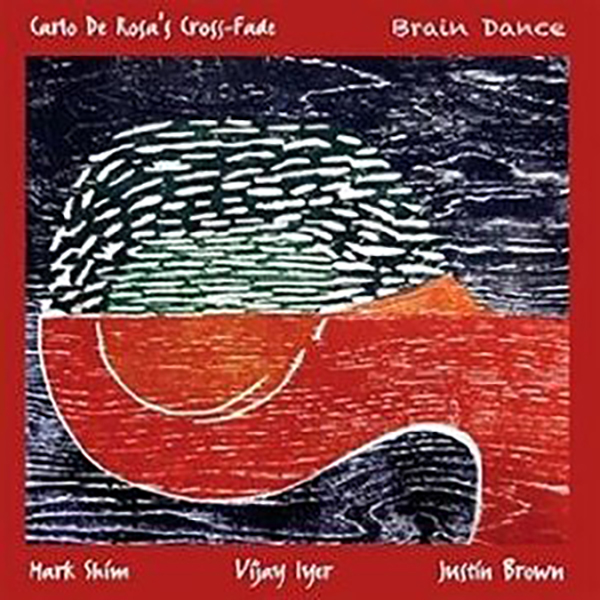
by Ian Mann
April 13, 2011
/ ALBUM
A stirring album from a group that must surely be a pretty dynamic prospect in live performance.
Carlo De Rosa’s Cross-Fade
“Brain Dance”
(Cuneiform Records Rune 317)
“Brain Dance” is the début album as a leader by New York based bassist and composer Carlo De Rosa. Since moving to the Big Apple in the mid 1990’s De Rosa has become an important player on the New York scene and has appeared as a sideman on a number of genre straddling recordings. His own album concentrates firmly on jazz with elements of funk and rock thrown in and his Cross-Fade band features three musicians who are currently hot names on the NYC jazz scene. Pianist Vijay Iyer, who also appears on Fender Rhodes, is already carving out a successful solo career, tenor saxophonist Mark Shim recently appeared in the UK with Steve Lehman’s acclaimed Octet and Justin Brown is one of the most dynamic young drummers around.
De Rosa’s choice of band name reflects the use of the cross fade technique in music and movie making and extends it as a metaphor for life experiences, the beginnings and endings of a typical human lifespan. Something of this quality comes out in the shifting nature of the seven De Rosa originals on this record. Not that these are overtly cinematic or narrative compositions, De Rosa’s pieces may be structured but they allow plenty of room for improvisation with each contributor sliding in and out of focus over the course of the album.
The album commences with the snappy, largely up tempo “Circular Woes”. It’s interesting to hear Iyer on Fender Rhodes having previously only heard him on acoustic piano. Initially the music is tightly focussed with the Jamaican born Shim’s short, sharp phrases punctuated by Brown’s crisply energetic drumming. De Rosa takes the first solo, an early example of what a monster bass player he is, dexterous and supple on this feverishly plucked solo. Shim follows him, clearly relishing the opportunity to stretch out but without ever overstaying his welcome. There are some terrific exchanges between the saxophonist, Iyer and Brown during the closing stages of the tune.
The enormous unaccompanied bass sound of De Rosa opens the following “For Otto” a robust piece of post bop jazz that sees Iyer return to the acoustic piano to deliver the impressive opening solo. Shim also produces another powerful statement on tenor, his tone urgent and querulous. Behind the soloists De Rosa and Brown negotiate some devilishly tricky time signatures. This is knotty, muscular stuff that must be more difficult to play than it is to listen to. Even when Cross-Fade are really pushing the envelope they remain well within the realms of accessibility.
The brooding ballad “Maja” presents an entirely different facet of the band. Shim’s tone changes to warm and breathy, Brown picks up the brushes for the first time and the whole thing represents a very welcome change in mood and dynamics. De Rosa impresses with the warmth and fluency of his solo and there are also significant statements from Iyer’s piano and Shim’s burnished tenor.
Although pounding and insistent “Headbanger’s Bawl” still offers more subtlety than its title might suggest. Above odd meter grooves Shim produces some of his most unfettered improvising and when he drops out Iyer delivers an astonishing solo that almost takes him into Cecil Taylor/Myra Melford territory. Brown and De Rosa show up well too with the latter switching to electric bass at one point.
The brief title track with Iyer back on Rhodes is little more than a vignette with the group’s opening free jazz ramblings quickly transforming themselves into the jaunty little tune suggested by the title. In comparison to the rest of the album it represents a charming miniature that packs a good deal of incident into its two and a half minutes.
By contrast “Terrane/A Phrase” is the album’s centre piece, a sprawling thirteen minute epic that covers an impressive range of bases. If anything epitomises the reasoning behind the group name this is it. De Rosa and Iyer deliver dazzlingly fluent early solos in a relatively orthodox post bop context before Shim digs deep, his forceful playing eventually leading the group into a more avant garde second section featuring De Rosa’s bowed bass. The echoing fanfares of this phase of the tune are both dramatic and effective and amongst all the experimentation and wilful dissonance the music remains eminently listenable.
The closing “Route 17” is more light-hearted and unashamedly funky with De Rosa on electric bass and Iyer on Rhodes. It still packs a considerable punch with solos from Iyer on Rhodes and Shim on growling low register tenor plus a series of volcanic polyrhythmic drum breaks from the impressive Brown.
Although a version of Cross-Fade, albeit with different personnel, has been around since 2005 “Brain Dance” still represents a remarkable début from De Rose. His gritty compositions are interpreted with considerable élan by his all star team with the leader not afraid to take his own share of the limelight. The retro Rhodes sound isn’t always to my taste but on the whole this is a stirring album from a group that must surely be a pretty dynamic prospect in live performance. Not that Cross-Fade lack finesse, despite its largely muscular demeanour this is a record that reveals fresh subtleties with each new listening. With elements of jazz, funk, rock and the avant garde this is an album capable of appealing to a wide cross section of the jazz public but without any inherent compromise in either the group’s playing or De Rosa’s writing.
blog comments powered by Disqus